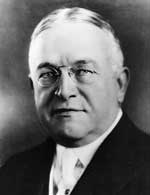 Mr. Newbury was a brilliant business executive who wandered into the political arena and paid dearly for the adventure.
Mr. Newbury was a brilliant business executive who wandered into the political arena and paid dearly for the adventure.
A graduate of Yale University, he began his career working for the Bay City and Alpena Railroad. In two years’ time, he had achieved the position of Superintendent but, unfortunately, his father passed away and his talents were required to take over the many family businesses. These enterprises included the Presidency of The Detroit Steel and Spring Company and directorships of many companies from the telephone company to banks to navigation interests. The automobile also attracted his attention.
While strolling the streets of New York one afternoon with his brother-in-law, Henry Joy, they stopped to inspect a Packard parked at the curb. A fire engine went by, the owner of the Packard ran out, cranked the car once and was off to the fire. The two men were so impressed with this performance that they decided to pool their funds to provide the capital to bring the Packard Motor Company to Detroit. It was located at the Boulevard and Mt. Elliott. Albert Kahn was the architect for the company. Out of the complex of buildings came a new type of industrial architecture based on reinforced concrete.
Along with his business interests, Mr. Newberry built a successful naval career. In 1893, he organized the Michigan State Naval Brigade. During the Spanish-American War of 1898, he was commissioned a lieutenant serving on the cruiser, Yosemite, off the Cuban coast. He also served as Assistant Secretary of the Navy. During World War I, Mr. Newberry was a Lieutenant Commander and an Assistant to the Commandant of the New York City 3rd Naval District until 1919. Most of his work in the Navy was directed toward improving the administrative machinery and it drew the attention of some politicians from the Republican Party of Michigan which was desperate to gain Republican seats in the Senate.
Some of the men wrote to Mr. Newberry in New York asking him to consider becoming a candidate in the 1918 primary. He responded by pointing out the fact that he was not a politician and that he was too busy with his duties at the time but would be happy to serve in whatever capacity they would choose. In the meantime, Henry Ford, with the blessing of Woodrow Wilson, decided to throw his hat into the ring. Due to the Michigan Open Primary Law, he was able to run for the nomination of both parties. Mr. Ford was well known for his anti-war sentiments. One of his well-publicized projects was his “Peace Ship”. He had built the ship and transported a group of people across the ocean with the specified purpose of “getting the boys out of the trenches by Christmas”.
Mr. Newberry, on the other hand, had a recognition problem with the voters. His supporters felt compelled to run ads and print a great deal of literature in order to define his candidacy and explain his positions.
Mr. Newberry won the nomination of the Republicans while Mr. Ford was the Democratic Nominee. Mr. Newberry won in November by a narrow margin. There was widespread speculation about the amount of money spent by the “Newberry Campaign”. Mr. Ford called for a recount. Many newspaper editors suggested Mr. Newberry and his “campaign” had committed other improprieties. All contributions were documented to have been provided by friends and none of Mr. Newberry’s own funds had been used. Many Congressional hearings were held and adjourned without any conclusions being drawn. A Grand Jury was convened in New York State and their decision was to dismiss all allegations against Mr. Newberry.
Mr. Ford continued to insist that the Senate needed to bring charges against Mr. Newberry. Finally, in 1920, Newberry was tried and convicted for violating the Federal Corrupt Practices Act. The penalties included a $10,000 fine and a two-year prison sentence. Since he had nothing to do with the campaign practices, he appealed through the courts and stayed out of jail. In a May, 1921 decision, the Supreme Court reversed his conviction on the grounds that the law used to convict him was unconstitutional. Congress had no power to regulate primary elections. At the same time, a Congressional Committee exonerated him. While the appeals were taking place, Mr. Newberry was given a provisional seat in the Senate. During this time, he did sign a resolution opposing the League of Nations. Mr. Newberry resigned from the Senate in order “to save the party any further embarrassment”.
This case led Congress to enact a Federal Corrupt Practices Act in 1925 but it has proven ineffective in containing congressional campaign financial irregularities.
Born: 1864
Died: 1945
